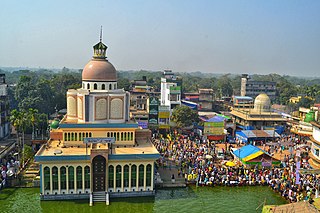
Fatikchari(Bengali: ফটিকছড়ি, romanized: Fôṭikchhôṛi) is an upazila of Chittagong District in Chittagong Division, Bangladesh. It is the largest Upazila of Chittagong.
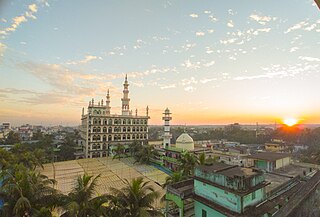
Al-Jāmiʿah al-Ahliyyah Dār al-ʿUlūm Muʿīn al-Islām, popularly known as the Hāṭhazārī Madrasah or the Great Madrasah, is a Qawmi institution of Hathazari, located in Bangladesh's Chittagong District. Established in 1901, it is the largest and oldest Deobandi seminary in the country. According to a 2009 National Bureau of Asian Research report, the highly reputed institution ranks among top ten madrasah in the subcontinent.
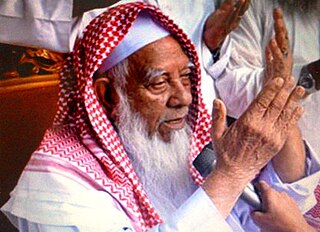
Shah Ahmad Shafi was a Bangladeshi Sunni Islamic scholar, the chief of Hefazat-e-Islam Bangladesh, Rector of Al-Jamiatul Ahlia Darul Ulum Moinul Islam Hathazari and also the chairman of Bangladesh Qawmi Madrasah Education Board. He was born in 1930 in Rangunia, Chittagong and was educated at Hathazari Madrasah and Darul Uloom Deoband.

Hefazat-e-Islam Bangladesh is a far-right conservative-islamic advocacy group consisted mostly of hard-line religious teachers and students. The group is mainly based on qawmi madrasas in Bangladesh. In 2013, they submitted a 13-point charter to the Government of Bangladesh, which included the demand for the enactment of a blasphemy law.

Muḥammad Junaid, popularly known as Junaid Babunagari, was a Bangladeshi Deobandi Islamic scholar, educator, writer, researcher, Islamic speaker and spiritual figure. He was the Amir of Hefazat-e-Islam Bangladesh, Shaykhul Hadith of Darul Uloom Hathazari Madrasa, vice-president of Befaqul Madarisil Arabia Bangladesh, Chairman of Chittagong Noorani Talimul Quran Board and Editor-in-Chief of Monthly Mueenul Islam.
Izharul Islam Chowdhury is the founder of Jamiatul Uloom Al-Islamia Lalkhan Bazar. He is the present executive president of Nizam-e-Islam Party and Nayeb-e-Ameer of Hefazat-e-Islam Bangladesh.
Sulṭān Zauq Nadvī is a Bangladeshi Islamic scholar, author and the founder of Jamia Darul Ma'arif Al-Islamia. He is known mainly for his expertise in and contribution to Arabic language and literature.

Syed Muhammad Rezaul Karim, also known by his title Charmonai Pir, is a Bangladeshi Deobandi Islamic scholar, politician, religious speaker and social reformer who serving as the second leader of Islami Andolan Bangladesh. He is also President of the Bangladesh Mujahid Committee and Bangladesh Quran Education Board, and the Vice President of Befaqul Madarisil Arabia Bangladesh.
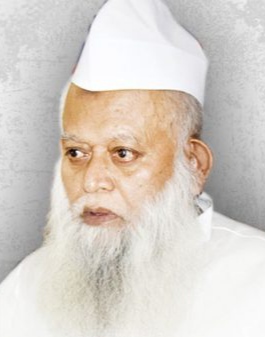
Nur Hossain Kasemi was a Bangladeshi Deobandi Islamic scholar, politician, educator, religious speaker and spiritual figure. He was the secretary general of Hefazat-e-Islam Bangladesh and Jamiat Ulema-e-Islam Bangladesh, vice-president of Al-Haiatul Ulya Lil-Jamiatil Qawmia Bangladesh, senior vice-president of Befaqul Madarisil Arabia Bangladesh and Shaykhul Hadith and rector of Jamia Madania Baridhara, Dhaka and Jamia Sobhania Mahmud Nagar. He had played a leading role in the Hefazat movement, Khatam an-Nabiyyin movement etc. He was well-known among the Muslim masses as an Islamic leader. He was also involved in running nearly 45 Islamic seminaries.
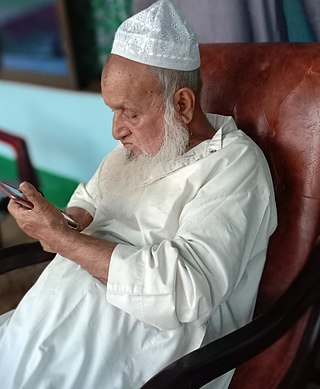
Shah Mohammad Muhibbullah Babunagari is a Bangladeshi Deobandi Islamic scholar, Politician and Academician. He is the current and 3rd Amir of Hefazat-e-Islam Bangladesh, Rector of Al-Jamiatul Islamiah Azizul Uloom Babunagar. He also held leading positions in Islami Oikya Jote, Befaqul Madarisil Arabia Bangladesh and Al-Haiatul Ulya Lil-Jamiatil Qawmia Bangladesh. He is considered one of the pioneers of Deoband movement in Bangladesh.
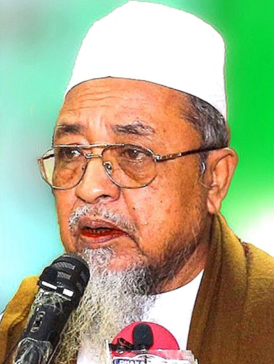
Nurul Islam Jihadi was a Bangladeshi Deobandi Islamic scholar, educator and spiritual figure. He was the Secretary General of Hefazat-e-Islam Bangladesh and International Majlis-e Tahaffuz-e-Khatm-e Nobuwat Bangladesh, Chancellor and Shaykh al-Hadith of Al Jamiatul Islamia Makhjanul Uloom. He was also a member of the Majlis-e-Shura of Darul Uloom Hathazari and Befaqul Madarisil Arabia Bangladesh, founder and patron of many mosques and madrasas, including Jamia Khatamunnabiyyin in the United Kingdom.

Ṣūfī ʿAzīzur Raḥmān was a Muslim theologian, teacher and reformer. After being influenced by Abdul Wahid Bengali in his student life, he became associated with the spread of the Deobandi movement into Bengal. In 1896, he co-founded Al-Jamiatul Ahlia Darul Ulum Moinul Islam.

Ḥabībullāh Qurayshī was a Bengali Islamic scholar and educationist of the Deobandi movement. He was the founding director-general of Al-Jamiatul Ahlia Darul Ulum Moinul Islam.
Mufakkir al-Islām Ḍiyā' ad-Dīn ibn Muqaddas ʿAlī, better known simply as Zia Uddin or reverentially as Nazim Saheb Huzur, is a Bangladeshi Deobandi Islamic scholar, politician and educationist. He is currently the president of Jamiat Ulema-e-Islam Bangladesh and Azad Dini Adarah-e-Talim, and an advisor to Hefazat-e-Islam Bangladesh. Uddin is also the director of Jamia Madania Angura-Muhammadpur and a member of Al-Haiatul Ulya Lil-Jamiatil Qawmia Bangladesh's permanent committee. He has played important roles in the 2013 Shapla Square protests and Khatme Nabuwwat movement, and has spoken out against the construction of the Tipaimukh Dam.
Harun Babunagari was a Bangladeshi Deobandi Islamic scholar, Sufi and an exegete of the Quran. He was the founder and first Principal of Al-Jamiatul Islamiah Azizul Uloom Babunagar, one of the oldest Qawmi Madrasa in Bangladesh.
Aḥmad Ḥasan ibn Waṣī ar-Raḥmān ibn Ḥamīd ʿAlī al-Jīrawī, popularly known as Shah Ahmad Hasan, was a Bangladeshi Islamic scholar and educationist. He was an early student of Al-Jamiatul Ahlia Darul Ulum Moinul Islam in Hathazari. Hasan established Al Jameatul Arabiatul Islamia Jiri, which was the second Qawmi Madrasah of Bangladesh.
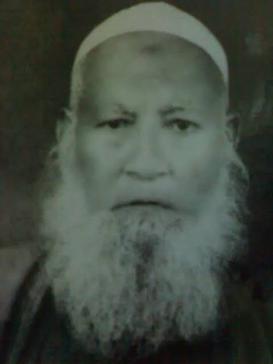
Shah Sultan Ahmad Nanupuri, also known by his daak naam Badshah, was a Bangladeshi Islamic scholar, teacher and author. He established numerous madrasas in Bangladesh and was the founding principal of Al-Jamiah Al-Islamiah Obaidia Nanupur for seventeen years.

Shah Abd al-Wahhab was a Bangladeshi Deobandi Islamic scholar, educator, jurist,preacher of Islam(tableeghi) and spiritual leader. He served as the second rector of Darul Uloom Hathazari, was a former vice-president of the Jamiat Ulema-e-Islam, and served on the jury of Chittagong Court for 23 years. He was an alumnus of Darul Uloom Deoband and Mazahir Uloom, and one of the important disciples of Ashraf Ali Thanwi. He is considered the second architect of the Darul Uloom Hathazari. He established several madrasas and mosques in Bangladesh and played various roles in the Bishwa Ijtema, the spread of Tablighi Jamaat across Bangladesh and Myanmar, Befaqul Madarisil Arabia Bangladesh, the Baitul Mukarram National Mosque, and the Islamic University, Bangladesh.
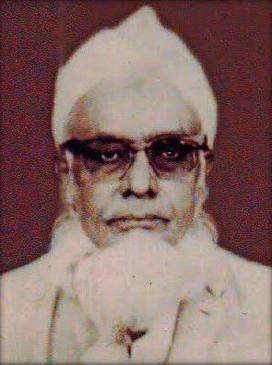
Muhammad Yunus Choudhury, popularly known as Haji Muhammad Yunus, was a Bangladeshi Islamic scholar and educationist. He was the second rector of Al Jamia Al Islamia Patiya, former president of Idarat al-Maʿarif and an active member of the Muslim World League. As the founding president of Befaqul Madarisil Arabia Bangladesh, Yunus contributed to the establishment and renovation of roughly 1500 madrasas in Bangladesh. He was awarded the title of Shaykh al-ʿArab wa al-ʿAjam by the Imam of Masjid al-Haram.















